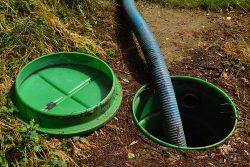How Often Should You Schedule Septic Tank Pumping?

1. Size of the Tank
The size of your septic tank plays a significant role in determining how often it needs to be pumped. Smaller tanks have less capacity to hold wastewater and solids, meaning they will fill up more quickly and require more frequent pumping. Larger tanks, on the other hand, can go longer between pumpings as they have more room for storage. As a general rule of thumb, smaller tanks (500-1,000 gallons) may need to be pumped every 1-2 years, while larger tanks (1,500-2,000 gallons) can go 3-5 years between pumpings.
2. Number of Occupants
The number of people living in your home also affects how often you should schedule septic tank pumping. More occupants means more wastewater entering the system, which in turn leads to faster filling of the tank. If you have a larger family or frequently host guests, you may need to pump your septic tank more frequently than a household with fewer occupants. As a rough guideline, a family of four with a 1,000-gallon tank may need to pump every 2-3 years, while a couple living in a smaller home with the same size tank could go 3-4 years between pumpings.
3. Water Usage
The amount of water your household uses on a daily basis can also influence how often you should schedule septic tank pumping. High water usage can lead to more frequent fill-ups of the tank, as more wastewater is being produced and flowing into the system. This is why it’s important to be mindful of water conservation practices, such as fixing leaks, using water-efficient appliances, and limiting unnecessary water usage. By reducing your water consumption, you can help extend the time between septic tank pumpings.
4. Type of Waste
The type of waste that goes down your drains can also impact the frequency of septic tank pumping. Certain substances, like cooking oils, grease, chemicals, and non-biodegradable materials, can harm the beneficial bacteria in your septic system and interfere with the treatment process. To avoid premature filling of the tank and costly repairs, it’s important to only flush or drain biodegradable, septic-safe materials. By being mindful of what goes down your drains, you can help prolong the life of your septic tank and reduce the need for frequent pumpings.
5. Age of the System
The age of your septic system is another factor to consider when determining how often to schedule septic tank pumping. Older systems may not function as efficiently as newer ones, leading to faster fill-ups of the tank and more frequent maintenance requirements. If your septic system is more than 20 years old, it’s a good idea to have it inspected by a professional to assess its condition and determine if pumping is needed. Regular inspections and maintenance can help extend the lifespan of your septic system and prevent costly repairs down the road.
Summary
The frequency of septic tank pumping depends on a variety of factors, including the size of the tank, number of occupants, water usage, type of waste, and age of the system. By taking these factors into account and following some general guidelines, you can ensure that your septic system remains in good working order and avoid costly repairs or backups. If you’re unsure about how often to schedule septic tank pumping, it’s always best to consult with a professional septic service provider who can assess your specific situation and provide tailored recommendations for maintenance. Remember, regular maintenance is key to keeping your septic system functioning properly and ensuring the health and safety of your household and the environment.
Got Questions About Your Septic System? Let Us Help!
The Macken family has been serving western New York since 1968. Our company specializes in the installation, repair, and maintenance of septic systems. We can also help you deal with your restaurant grease trap. We have acquired a decade’s worth of experience and know all the ins and outs of keeping your septic system worry-free. The key to a well-functioning septic system is regular maintenance. While it is easy to be lulled into a false sense of security, make no mistake: eventually, a neglected septic system will require attention. So be proactive and give us a call today before you have a stinky situation to deal with.
Categorised in: Septic Tank Pumping
This post was written by admin
